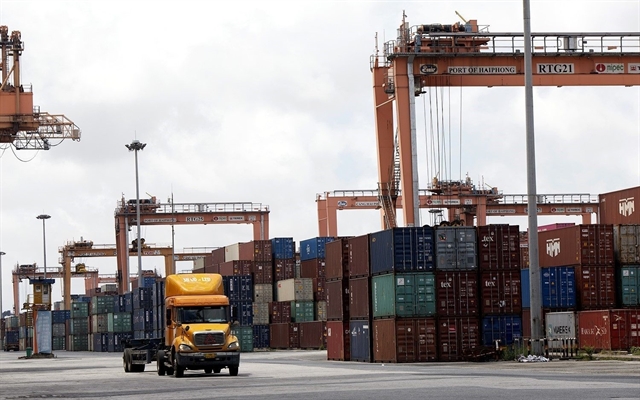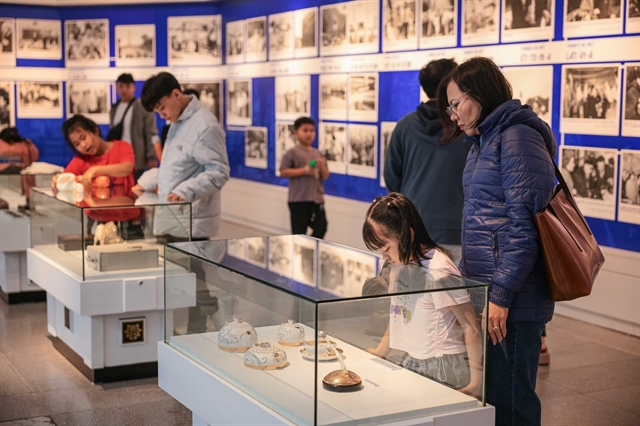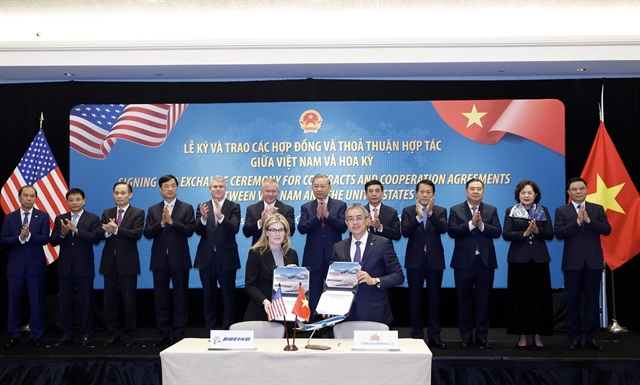 Opinion
Opinion

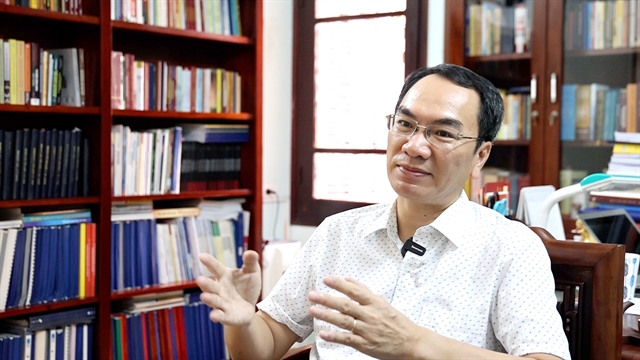 |
| Associate Professor Chu Văn Tuấn, Director of the Institute for Religious Studies. —VNS Photo Nhật Hồng |
Việt Nam News reporter Lê Hương interviewed Associate Prof. Chu Văn Tuấn, Director of the Institute for Religious Studies on religious freedom in Việt Nam.
Could you please brief the situation of religions in Việt Nam?
As you may know, the Government Committee for Religious Affairs has just published a white book on religion, which states that there are now 16 official religions in the country with 41 representative organisations gathering in total 26.5 million followers. Before 2004, there were only six official religions with fewer than 17 million followers. So we can see the development of religions in Việt Nam, especially after đổi mới (renewal), with many more religious organisations recognised gathering more followers accompanying more secured religious freedom. We should confirm that fact.
In terms of legal foundation, after 2004, we had an Ordinance on Belief and Religion, which can be considered the first of its kind. Then in 2016, we had the Law on Belief and Religion, which was accompanied by a series of decrees to implement. We also had the Law on Land, Law on Education, and other laws, which contained contents involving religion and belief. So the legal system has been fairly well developed. Then now we have the white book on religion [titled Religion in Việt Nam], which shows a clear and transparent policy and affects a lot to religious life in Việt Nam. In a book I published two years ago, I stated that if we compare the religious situation before and after đổi mới, some people used the phrase “chalk and cheese”. I have to confirm that today’s religious situation is quite different from that before đổi mới.
Could you talk more about the achievements of religious freedom in Việt Nam?
One of the first achievements of religious life in Việt Nam is that we have secured freedom of religion and belief. We can see this very obviously before we named it a citizen’s right. Yet recently we have considered it a human right. This means that people, including those who are not Vietnamese citizens, have the same rights in Việt Nam. Foreigners and prisoners still have that right. This is an important change in securing people’s rights in being free to practise their own religions and beliefs.
Secondly, the fact that the Government allows religious groups and organisations to host their activities is a step forward. Before, it took a religious group 23 years to be officially recognised and be able to organise activities. Now, the process needs only five years. Religious followers should have places to practise their beliefs. Their organisations should be approved by the authorities. I think we have done well in this task in the past few years. When organisations meet all requirements and conditions as denoted in the law, they will be allowed to organise activities. Besides 16 recognised religious groups and organisations, many religious groups have the right to gather and host activities. Many foreigners come here to live, bringing along their beliefs like Judaism, Hinduism, Protestantism, and so on. They just have to register their beliefs with local authorities who represent the community. Local authorities will secure their activities. So we can admit this is an advance in securing religious freedom in Việt Nam.
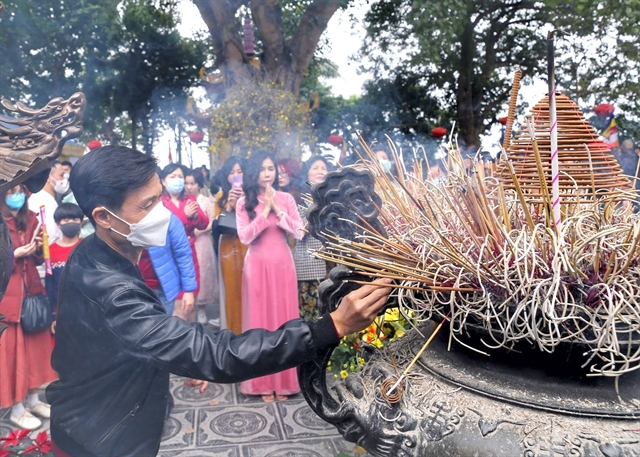 |
| Buddhists at a pagoda in downtown Hà Nội. — VNA/VNS Photo |
Has your institute conducted any research on the matter?
We have done a lot of research on religions, in different regions, on their lives and practices. One piece of research that I want to highlight is on religion's role in sustainable development in Tây Nguyên (Central Highlands). Ten years ago, we did research on Buddhism, Catholicism, Protestantism, and Caodaism, which are the four main religions in the region. Our research showed that in Central Highlands, religious life is bursting, especially with the rapid spread of Protestantism. The religions spread to all minority groups in the region. Locals are free to practise. Even inside a group like Ê Đê, some of them follow Catholicism, some follow Protestantism, some follow Buddhism, and some follow nothing, they just worship their ancestors. Before, religions had difficulties in practising rituals in groups. Yet after the Government issued the Directive No 01 in 2005 involving Protestantism, their difficulties were untied. All Protestant groups were allowed to gather in a certain place provided that they had a representative person and a certain number of followers. Researchers from our institute, including myself, visited such places and saw they are free to gather, practise their rituals, sing holy songs, and listen to sermons. We came to the Catholic church, they are free to worship.
What do you think about the 2022 Annual Report on international religious freedom by the US Commission on International Religious Freedom, which petitioned the United States Department of State to re-list Việt Nam into the “Countries of Primary Concern” (CPC)?
The US has for a long time hardly admitted any achievement in Việt Nam’s religious freedom. They have tended to focus on the so-called violations of religious freedom. We should differentiate between securing proper religious freedom and violating the rights of religious freedom. These are two different things. Some examples the US mentioned are not religious organisations, just some groups that bear the name of religious organisations. They may even be terrorist organisations under the name of some religion to destroy national security and harm national solidarity and society. The US did not care which organisations they were, or whether they were proper religious organisations. They just saw Việt Nam stop some organisations and blamed Việt Nam for violating religious freedom, which is a familiar guise and unchanged approach. We actually should be clever. Those organisations are not religious organisations.
Or they are new religious phenomena, which are against fine customs, harming social security and order, people’s health and dignity. They are not religious and violate the law. So the authorities should stop them to protect the proper rights of the people.
For example, in a recent situation in Kenya, when many people went on strike to die. This is not a religion. A religion should aim for goodness, make people do good, avoid bad things, and bring people happiness. A belief that makes people diet to die to return to God is not a proper belief. The US may consider this a kind of terrorism. Other countries may consider it a legal violation.
How can we judge a new religious phenomenon, especially fringe religious groups that could potentially be considered cults?
We should check the law of that belief, and whether its law goes against proper morality and national culture. We should check whether following and practising that belief harms health, dignity, and life. Does that belief affect the rights and property of followers? Does that belief harm society, or cause social disorders? Does it make people worry? If the belief is of this kind, it is a cult. But if the whole of society judges it as good, it is not.
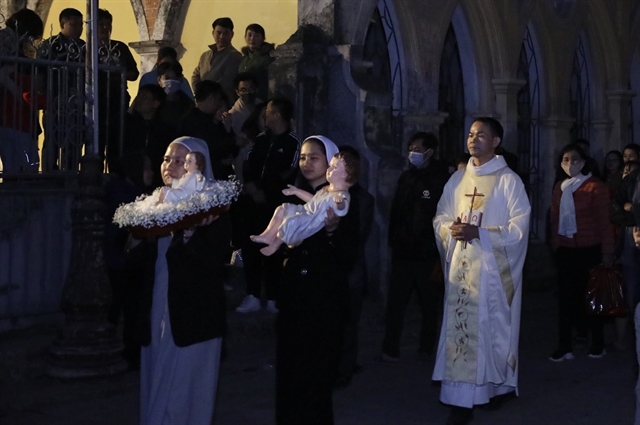 |
| A procession at a church in the northern province of Hà Nam at Christmas 2022. — VNA/VNS Photo |
What do you think are common issues for religions in Việt Nam?
All religions have a common concern: building the number of their followers. Each religion has its own way to develop this number. Now, Buddhism is spreading in ethnic minority groups in the Central Highlands, northwestern and southwestern regions. Many pagodas are still deserted in remote areas of ethnic minority groups. Buddhism now pays much concern to this issue. More and more pagodas are being built. Monks are encouraged to work in remote areas. The same thing happened to Protestantism. They are trying to gather more followers inside ethnic minority groups. Protestantism has for a long time tried to expand in remote areas. They have been very successful. Now Protestantism also wants to expand to labourers, workers, and students. It seems that all religions tend to be very active in social activities, through which they can gather more followers and show their roles, and get recognition by society, authorities, and the State.
Could you say something about the role of religion in our society?
Religion has played an important role in various fields of society. Making contributions to society is a function of religion, through which it can enhance its role for the common good. Religion has been very active in charity work that supports society, especially in health care, education, aiding the poor, improving infrastructure, taking care of needy patients, and so on. The State and the Party have coined religion’s support a huge power source for social development. VNS

